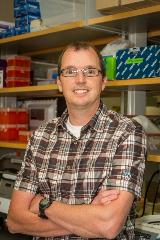Thomas E. "Tem" Morrison, PhD
Professor
Department of Immunology & Microbiology
University of Colorado Anschutz School of Medicine
Morrison Lab Website

Thomas E. "Tem" Morrison, Ph.D., earned his doctoral degree in 2004 from the University of North Carolina at Chapel Hill, Department of Microbiology and Immunology. He completed 5 years of postdoctoral research training at the University of North Carolina at Chapel Hill, Department of Genetics and Carolina Vaccine Institute, in the laboratory of Mark T. Heise, Ph.D.
Dr. Morrison joined the faculty of the University of Colorado School of Medicine, Department of Immunology and Microbiology in 2009.
Dr. Morrison joined the faculty of the University of Colorado School of Medicine, Department of Immunology and Microbiology in 2009.
Arthropods, including mosquitoes, sand flies, and ticks, often bite humans to obtain blood meals. During feeding, these arthropods can transmit infectious pathogens, such as RNA viruses and protozoan parasites, to humans that cause devastating diseases (e.g. chikungunya, dengue, leishmaniasis, malaria). Our laboratory seeks to improve our knowledge of the molecular pathogenesis of these infections (i.e. what are the critical host-pathogen interactions that contribute to protection or pathology?). This knowledge may improve our ability to prevent and treat these diseases through the development of vaccines as well as pathogen- or host-targeted therapeutics.
Mosquito-transmitted RNA viruses include flaviviruses, such as Dengue virus and West Nile virus, bunyaviruses, such as Rift Valley fever virus, and alphaviruses, such as chikungunya virus, Ross River virus, and Venezuelan equine encephalitis virus. Chikungunya virus, Ross River virus, and related arthritogenic alphaviruses cause explosive epidemics that can involve thousands to millions of infected patients. Chikungunya, which translates as “disease that bends up the joints”, is characterized by an abrupt onset of fever with severe joint pain, and the pain may persist for weeks to years. Chronic chikungunya joint disease, and the chronic rheumatological diseases caused by the related arthritogenic alphaviruses, may result from persistent infection in musculoskeletal tissues. To investigate the molecular pathogenesis of these infections, we use genetic strategies, molecular and cellular approaches, and mouse models of acute and chronic chikungunya virus or Ross River virus infection. Using these systems, we study viral interactions with the host immune response. We are particularly interested in defining mechanisms of activation and resolution of virus-induced inflammatory responses, immunological mechanisms that control virus clearance versus virus persistence, and viral genetic determinants that counteract host anti-viral responses and promote persistent infection. The mouse models we use enable us to utilize transgenic and knockout strains to study the role of specific host genes in the disease process and investigate the genetics of host susceptibility to acute and chronic infection. Additionally, due to the well-established alphavirus reverse genetics system, we are able to easily manipulate the genome of the virus. Taken together, these advantages provide a highly tractable system to establish mechanisms by which viral interactions with the host lead to disease. In addition, we utilize cell culture-based and animal infection models to test novel anti-virals and immunomodulatory therapeutics against acute and chronic CHIKV/RRV infection.
Arthropod-transmitted protozoan parasites include Leishmania (the causative agents of leishmaniasis), Trypanosoma (the causative agents of Sleeping sickness and Chagas' disease) and Plasmodium (the causative agents of malaria). Leishmaniasis is a major global health problem that affects more than 12 million people worldwide. Leishmania parasites are endemic in Asia, the Middle East, sub-Saharan Africa, and South America. These obligate intracellular parasites are transmitted to humans by infected sand flies and cause a spectrum of clinical manifestations that includes cutaneous leishmaniasis (localized lesions of the skin), mucocutaneous leishmaniasis (mucosal lesions; nose, mouth, throat) and visceral leishmaniasis (parasite infection and disease in visceral organs including the liver, spleen, bone marrow, and lymphatic system). We are interested in defining interactions between leishmania parasites and host macrophage that influence host innate and adaptive immune responses, and ultimately parasite clearance versus persistence. In addition, we aim to define parasite-encoded factors that determine parasite resistance or susceptibility to oxidative/nitrosative stress, a major host defense mechanism employed by infected macrophages. To accomplish these goals we use cell culture and murine infection models. We also use a variety of genetic tools to manipulate the genome of these organisms.
Click here for a list of Dr. Morrison's recent publications.
Immunology Microbiology (SOM)
CU Anschutz
Research I North
12800 East 19th Avenue
Mail Stop 8333
Aurora, CO 80045
303-724-4224
School of Medicine
General
Students
CMS Login